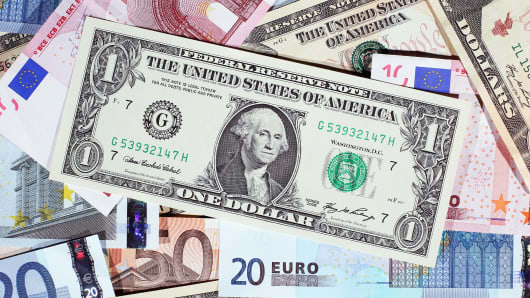"The dollar sold off versus the yen after the disappointing ISM data, but trade is very thin and investors are likely using the data as an excuse to lighten dollar positions ahead of this week's events," said Omer Esiner, chief market analyst at Commonwealth Foreign Exchange in Washington, D.C.
Both the European Central Bank and Bank of Japan are to hold monetary policy meetings later this week.
With the path of Federal Reserve policy largely hinging on the state of the U.S. labor market, Friday's U.S. monthly payrolls data has the potential to sway financial markets. "There is a lot of optimism already priced into the dollar regarding the U.S. economy, and the dollar could be poised for a sell-off should upcoming data disappoint," Esiner said.
The greenback has rallied broadly this year as evidence mounted that the U.S. economy is on a stable path to recovery. The dollar index has gained about 3.6 percent so far in 2013.
"There are some clear signs that recent growth momentum in the manufacturing sector will not be easily built," said Alan Ruskin, head of G10 FX strategy at Deutsche Bank in New York. "The data will tend to undercut some of the enthusiasm in the long dollar exposure."
Even so, Ruskin said the U.S. manufacturing report was not all "gloom and doom," with both the employment and new orders components posting new highs.
Against the yen, the dollar fell 0.9 percent to 93.34 yen after earlier falling as low as 93.16, the lowest since March 6.
The euro dropped 0.7 percent to 119.94 yen, the lowest since Feb. 27.
Korean Tensions
Tensions in the Korean Peninsula also supported the yen, analysts said.
South Korea on Monday said it will strike back quickly if the North stages any attack on its territory after North Korea earlier said the region is on the brink of a nuclear war.
(Read More: South Korea Vows Fast Response to North; US Deploys StealthFighters)
Investors earlier brushed off a disappointingly narrow improvement in Japanese business sentiment over the last quarter shown by the Bank of Japan's Tankan survey, with the focus more on the central bank's policy review later in the week.
(Read More: Japan Corporate Sentiment Improves: BOJ Tankan)
The BOJ is widely expected to scale up its bond buying and to extend the maturities of the bonds it purchases under its new governor, Haruhiko Kuroda. Bets on a radical shift in the BOJ's policy have ramped the dollar up 20.9 percent against the yen in the last two quarters, pushing it to a 3 1/2-year high of 96.71 yen last month.
The euro, meanwhile, was up 0.3 percent against the dollar at $1.2848, rallying from an earlier low of $1.2770.
Europe's common currency was still down 2.6 percent so far this year and has slid steadily since February, when it hit a 14-month high of $1.3711.
Meanwhile, over the weekend, the Cypriot central bank confirmed that major depositors in Cyprus' biggest bank would lose around 60 percent of savings over 100,000 euros, well above the initially touted cut of 30 to 40 percent.
The euro has major support around $1.2680, a 61.8 percent retracement of its July-February rally. But a break there could open the way for a test of last year's low near $1.20.


